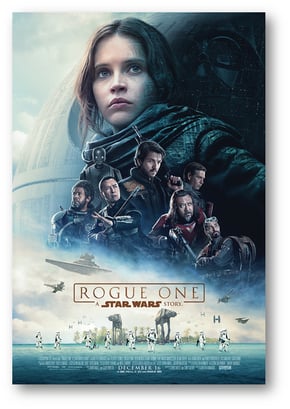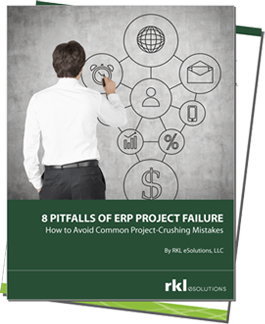 I watched the latest Starwars over the holiday break "Rogue One." Not only was I was intrigued by the title but by the trailers' reference to taking on what seems to be an enemy too overwhelming to ever defeat.
I watched the latest Starwars over the holiday break "Rogue One." Not only was I was intrigued by the title but by the trailers' reference to taking on what seems to be an enemy too overwhelming to ever defeat.
I found a lot of relevance in "Rouge One" to what we do as a company, and to what we see happening with our clients (in too many cases). I have outlined the connections I see in the table (below).
| Star Wars – Rogue One |
Your Supply Chain |
||
| The problem | The Evil Empire continues to oppress the galaxy | Continual firefighting, expediting, high logistics expenses, and excess payrolls and overtime expenses continue to oppress (depress) your company's bottom-line | |
| Increased awareness | Imperial transport pilot Bodhi Rook defects, bringing with him a halographic message from Galen Erso, making Rebel leaders aware of a defect he has built into the Death Star's reactor design | A consultant who as defected from "the Dark Side" (read: traditional inventory and MRP methods, see below) brings your company news that there is a fatal defect in traditional MRP logic and related methods | |
| Reluctance exhibited | Many of the Rebels don't believe that the halographic message is real, or that it is possible to overcome the Evil Empire | Many executives and managers in your company don't believe that there is a defect in "the way we've always done things" or that is even possible to make dramatic improvements to the bottom-line by trying new methods | |
| Overcoming reluctance | A small, but dedicated, group of Rebels believe that it just might be possible to defeat the Evil Empire—especially if the alleged defect in the reactor design exists; Besides, continue as they are today is to continue without any real hope for the future | A few executives and managers in your company begin to believe that a real change is possible if the alleged defect in traditional approaches to inventory and supply chain management is real and can be overcome; Besides they are tired of the constant firefighting without real hope for the future | |
| Commitment to try | The small band of dedicated Rebels decides they must try to do whatever it takes to defeat the Evil Empire and expose the self-destructive defect in the Death Star's reactor | The small group of executives and managers decides that they must try to bring long-lasting and effective change so that their bottom-line can (finally) see some real growth and their "evil" competition can be overthrown | |
| Giving their all | The dedicated Rebels realize that only being half-in will doom the entire effort to failure; They decide to give it their all | The executives and managers recognize that this new approach means doing things in a radically different way; They want to do a "pilot", but realize that whatever venue they choose for their pilot must be wholeheartedly committed to the new processes and approach | |
| Success | When the small band of Rebels demonstrate some success in reaching their initial goal against the Evil Empire, the rest of the Rebel forces join in. | The small group of executives and managers choose one plant as their "pilot" and codename the project "Rogue One"; When the other managers and executives see the levels of success being achieved under "Rogue One," they are anxious to see the same results in their own operations. | |
Do We Have Bodhi Rook's Thankless Job?
I guess, sometimes in our role as consultants, we sometimes feel like the defecting Imperial transport pilot, Bodhi Rook. Our message isn't believed. People suspect that, somehow, the message is a "trick"—an attempt to get them to take foolish actions that may jeopardize their larger mission (which is, probably, survival).
Even though our clients may feel like they are under the oppression of an invisible "Evil Empire," they find any offer of hope almost beyond belief.
While they are clearly engaged in an ongoing and, all too frequently, a no-win battle in which they constantly expending huge resources—time, energy, management attention, and money—they still seem to have a tremendous reluctance to hear well-intended and well-founded offers for real hope.
Traditional MRP as the "Death Star" with an Inherent Defect
Joe Orlicky was to the development of traditional MRP (material requirements planning) what Galen Erso was to the development of the Imperial Death Star. The difference is that Joe Orlicky never intended to build a fatal flaw into traditional MRP. The first edition of Orlicky's Material Requirements Planning sold more than 140,000 copies.
The flaw was not intentionally built into MRP. Nevertheless, to some extent the flaws existed from the beginning. Still, traditional MRP was quite effective in the world of the 1960s and 1970s (the book was published in 1975), when the methods were developed, articulated and first implemented.
Today's supply chain world is much, much different than that world. So much different, in fact, that the vast majority of companies still running traditional MRP software—that is, almost every major ERP system on the planet today—find that their supply chain managers absolutely must supplement their MRP output with spreadsheets, external databases, home-grown applications or even whiteboards in order to perform their jobs effectively.
That should be evidence enough to executives and managers that something is broken. But, alas, they still find it hard to believe that "a fatal flaw" truly exists in the "Death Star" of traditional MRP.
Overwhelming Evidence of Success
Despite the fact that all of the published literature shows that companies who implement a conscientiously applied program of DDMRP (demand-driven MRP) have achieved dramatic improvements in their top-line, bottom-line and every key metric (like lower inventories, shorter lead times, and higher customer service levels), we always consider ourselves fortunate if we can gain the hearts of a "small band of executives and managers" (read: heroes) who have begun to see a new vision of what could be for their company. (Contact us: We will be happy to send you documentation on achieved results in case studies.)
Become a "hero." Take the journey!



